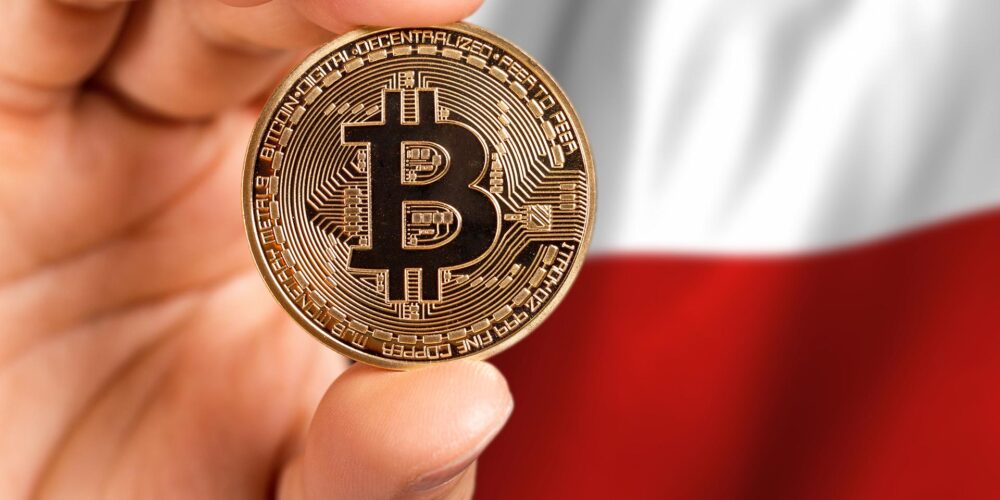How Bitcoin Becomes a Lifeline for Victims of Repression and Financial Exclusion – Explains Lyudmyla Kozlovska [INTERVIEW]

Bitcoin is not only a cryptocurrency, but above all, it is a tool enabling the defense of human rights, providing humanitarian aid, and survival in the face of political persecution.
Because of its independence, Bitcoin has become a refuge for people excluded from the traditional banking financial system. For example, the Republic of El Salvador adopted Bitcoin as its national currency, as 70% of the citizens of this small country did not have access to the global financial system. Nevertheless, we don’t need to go as far as South America to find examples of Bitcoin’s humanitarianism.
Lyudmyla Kozlovska, due to a negative assessment by the Internal Security Agency (ISA), was cut off from the European financial system and expelled from Poland and the European Union in August 2018. The Polish authorities considered her to be a threat to national security, which sparked a lot of controversy and protests from non-governmental organizations, politicians, and citizens.
By law, the ISA’s assessment enabled the expulsion of Lyudmyla without presenting evidence, an indictment, or a court trial. Undoubtedly, such a legal solution, which allows for such drastic measures, is necessary for the protection of state interests. But what if the negative assessment issued by the ISA is based on conjectures and is, in fact, incorrect? Should unclear premises be a sufficient reason to destroy someone’s life?
Lyudmyla Kozlovska, in our exclusive interview, explains how Bitcoin saves the lives of people excluded from the financial system. However, before we move on to the conversation, it’s worth exploring in more detail the context of this dramatic story.
What if the real reason for Kozlovska’s expulsion were not the information gathered by the ISA? What if this whole story is the result of political oppression, drawing from the Russian and Belarusian model of governance?
Who is Kozlovska?
Lyudmyla Kozlovska is a Ukrainian human rights activist, founder and president of the Open Dialogue Foundation, which monitors the situation in the post-Soviet area.
Born in 1985 in Sevastopol, Crimea, she established a Ukrainian library and organized literary evenings there at the age of 13. In 2004, she took part in the Orange Revolution in Ukraine. In 2008, she moved to Lublin, where she studied at the European College of Polish and Ukrainian Universities. A year later, she established the Open Dialogue Foundation, aiming to defend human rights, democracy, and the rule of law in the post-Soviet area.
The Open Dialogue Foundation has been active in many countries such as Kazakhstan, Uzbekistan, Kyrgyzstan, Moldova, Russia, and Belarus, supporting political prisoners, victims of torture, repression, and corruption. In Poland, the foundation engaged in protests against changes in the judiciary and the constitution, and collaborated with the political opposition.
How did Kozlovska’s expulsion from Poland and the EU come about?
Lyudmyla Kozlovska, president of the Open Dialogue Foundation, is known for her work in human rights in the East, particularly in Ukraine. In Poland, she became famous thanks to her husband, Bartosz Kramek, the head of the foundation’s council and an active social activist, who strongly opposed the judicial reforms in the country.
Kozlovska’s situation escalated in 2018 when, based on a negative assessment by the Internal Security Agency (ABW), she was expelled from Poland and the European Union. Her situation was complicated when Belgian border guards detained her at Zaventem airport, informing her that the Polish Ministry of Interior and Administration had entered her details into the Schengen Information System (SIS) with the highest alert, preventing her return to Poland and any Schengen zone country.
Under controversial circumstances, Kozlovska was accused of ties with Russian special services and acting to the detriment of Poland. Both she and her husband denied these allegations, claiming that they were merely a pretext for political repression and revenge for the foundation’s critical stance towards the Law and Justice (PiS) government. Despite her expulsion, Kozlovska did not give up fighting for her rights. She then began to take an interest in cryptocurrencies, especially bitcoin, as a potential tool in the fight for the rule of law.
The decision of the Polish authorities met with a broad international response and drew criticism from many institutions. The Ombudsman, Adam Bodnar, considered it to be disproportionate and unfounded. The Helsinki Foundation for Human Rights classified Poland’s actions as illegal and appealed them to the European Commission. Organizations such as Amnesty International, Human Rights Watch, and FIDH expressed their support for Kozlovska and appealed for her readmission to the EU.
Five European countries – Belgium, Germany, France, Switzerland, and Spain – ignored the Polish ban in the SIS system and accepted Kozlovska onto their territory. In doing so, they expressed solidarity with the activist and opposition to the violation of her rights. In these countries, Kozlovska met with representatives of parliaments, governments, and social organizations to explain her situation and defend her foundation.
What is the fate of Kozlovska and her foundation?
Lyudmyla Kozlovska persists in her work for human rights in the East, despite encountering adversities and pressures from the Polish authorities. The Open Dialog Foundation, which she leads, continues its projects and campaigns, cooperating with partners on the international and local stage. Kozlovska is applying for political refugee status in Belgium, where she currently resides. She is also seeking to annul the ban on entering Poland and the EU, which she considers baseless and discriminatory.
Kozlovska hopes that society will not be deceived by the manipulation and propaganda of those in power, and will appreciate her contribution to the defense of democracy and the rule of law in Poland and around the world. She expresses hope for a return to Poland, which is her second homeland.
Financial exclusion? Bitcoin turned out to be a salvation.
In the next part of our material, we will let the heroine herself speak in an interview she gave exclusively to our editorial team. If you are unable to watch the recording, you can find a transcript of the conversation below.
Daniel Haczyk (Web Economy): How did you get interested in Bitcoin? How did it start?”
Lyudmyla Kozlovska (Open Dialogue Foundation): Well, as the Open Dialogue Foundation, we started using Bitcoin and stable coins as a tool of basically the bank of last resort. This was because we were deprived of the right to have traditional financial instruments like banking services, like insurance services, due to political persecution organized by three authoritarian states, or illiberal states. At the time, it was Kazakhstan, Moldova during Plahotniuc’s time, and unfortunately, Poland. We had defended the rule of law, judges, and human rights in the country. What happened was, basically all our banking data was weaponized against us, our donors, our accountant, our volunteers, and our recipients of the funds. At the end of the day, banks in Belgium, where I was forced to move at some point from Poland, were terminating our bank accounts one by one. As we started to analyze what was happening, during this time while we were defending our rights to use traditional financial instruments, we used Bitcoin to fundraise, to survive, while being in the heart of Europe. So, it’s not something abstract for us, it’s basically a human rights tool.
That’s the first thing. The second thing is that we used Bitcoin to deliver humanitarian aid to Ukraine, specifically after the full Russian invasion of Ukraine since last year. We were capable of delivering hundreds of sets of bulletproof vests, helmets, and medical equipment on the second day of the war because we used the speed of Bitcoin. While everyone was waiting for transactions from the traditional financial system, which was actually paralyzed completely in Ukraine, we used Bitcoin to fundraise and we were able to deliver hundreds of sets of bulletproof vests and helmets to Lviv and even to Kyiv. Now, we have fundraised over 7 million Euros and delivered over 7000 pieces of protective equipment to Ukraine.
The third cause is to support the families of political prisoners and human defenders in authoritarian states. In our coalition, we run a ‘Building True Change Coalition’ (BTC Coalition) in Europe, and there are activists from Turkey, Kazakhstan, Belarus, Russia, like the Navalny Foundation, and even African countries and Palestine. All of us experience the same problem; we cannot use traditional financial instruments because regimes can control and weaponize our banking data against all our activists and our network of human defenders in these countries.
For example, in Palestine, one member of our coalition, Fadi El Salomin, had his banking data published on a website of extremist organizations and as a result, his family members and his house were shot with 60 live bullets by a terrorist organization. This was a retaliation for his anti-corruption activism. In Kazakhstan, if someone wants to fundraise money to support Ukraine or just for families of political prisoners, it takes only three to five minutes to freeze a bank account if you announce it on social media. So, imagine the speed at which your bank account can be terminated in authoritarian states. We’re not even mentioning African countries which are completely deprived of the right to have banking services because there is no identification and no KYC procedure for the population.
So, Bitcoin in all these situations became a tool of a bank of last resort. It became a tool for the Belarussian opposition, who experienced one of the biggest leaks of donations. For example, over 60,000 people were exposed to the regime of Lukashenko because Gofundme, Patronite, Facebook, were forced to give all the donor data to the Bank of Belarus. Of course, the special services of Belarus used this data to accuse all of these people who donated even one euro of extremism or financing extremism, and some of them were sentenced up to 17 years.
It’s a huge problem, and again in all of this situation, we have already proven with years of experience of using Bitcoin that it’s a safe transaction. For us, it’s crucial to have special regulation. That’s why we meet with a lot of regulators across Europe, explaining the social good, why we use Bitcoin as a bank of last resort, as a tool for delivering humanitarian aid, and as a tool for human rights. And this is how we operate.
Do you think people in Europe understand these problems? How conscious are you about this?
I think a lot of people in Europe don’t understand this problem because, first of all, they have the privilege to use traditional financial instruments. They don’t experience the problem of exclusion. But with upcoming regulations, which are becoming tougher for those who are, for example, falsely accused or attacked, this will be an issue. So far, there is no procedure on how to defend your rights, how to restore your rights if you lose your bank account. What can you do nowadays without a bank account? I mean, you have no means to survive in Europe, right? You can’t rent an apartment, you can’t pay your taxes, well you have to, but you can’t, right? You can’t run your company. So it’s a huge problem, and a lot of people don’t understand that you can find a solution like Bitcoin to operate freely. But there is a general trend, unfortunately. If you look into the general narrative of regulators, they want to regulate crypto asset providers and crypto assets generally in the same way as the banking system. That means it’s going to be basically exposed to the same violations.
Do you mean MiCA regulations?
No, MiCA regulation is just one part of it. MiCA regulation provides some order, and of course, it also has its issues. But generally, it’s protection for customers. It used to be very aggressive in draft regulation. We worked hard with regulators to, for example, eliminate very negative language on Bitcoin mining, which we saw as absolutely ungrounded. It was based on outdated information from the past which has nothing to do with reality. No one is using traditional electricity pricing right now for mining. But most regulators are unaware of this information, and they of course use all smear campaigns existing in mainstream media to attack or even to regulate Bitcoin. So our role is to explain to regulators that it’s actually false information and to share with them what is in reality. Bearing all of this in mind, the crucial role of the media and Bitcoiners is to spread real information about the purposes and everyday uses of Bitcoin, and how it can change your life.
For me, operating a Bitcoin company in Poland is quite challenging because Polish banks are hesitant to open accounts for companies associated with Bitcoin.
With upcoming AML regulation it’s going to be changed. Why? It is because we, as activists, alongside Bitcoin enthusiasts like Obi Nwosu, the founder of Fedimint, have been advocating for change. We have reached out to over 100 regulators across Europe, explaining that we use Bitcoin for humanitarian and human rights purposes and need to have a “bank of last resort”. This means that our activities are legitimate. If you look into the provisions of the adopted report on anti-money laundering regulations, you will see that NGOs, activists, and all entities using crypto assets will have a “bank of last resort”. This is essential to bridge the gap between fiat and crypto asset providers before mass adoption occurs.
It is also crucial for NGOs, which may have a negative reputation with regulators, to use Bitcoin. We have to work together to improve the situation. Many regulators understand this once they comprehend Bitcoin and its social benefits for their constituents. So, we all have a responsibility to educate and advocate. Next time, your company may be able to open a bank account because the Polish government, currently one of 27 countries, will be regulated by an upcoming regulation mandating a “bank of last resort” for all companies.
Many central banks are currently exploring central bank digital currency (CBDC). The head of the European Central Bank recently mentioned that it would provide less anonymity than the banking system. What are your thoughts on the impending CBDCs and the threats they might pose?
We view this with significant concern. We see what’s happening in authoritarian countries like China and Turkey, and we find the concept of CBDC rather nightmarish. CBDC could potentially expose the vulnerabilities of a democratic country. Therefore, we are calling on Bitcoiners to participate in the decision-making process. We aim to educate regulators, as many of them are unaware of the consequences of the decisions they are making due to skewed media representations. The mainstream media tends to portray Bitcoin negatively and CBDCs overly positively. There’s a lack of balance, and we need to address it.
The current shaping of CBDCs is a significant risk to democracy as they could turn into policing instruments, tracking you every day and night. This is already happening with anti-money laundering regulations. For example, the Moldovan and Polish governments have used banking surveillance to prosecute me, my family members, and our foundation activists on Belgian soil. The same has happened with activists from Kazakhstan and Turkey. This issue is widespread, and we need to protect our banking data and have safeguards in place.
We advocate against any activities that infringe on privacy and could potentially be included in CBDCs. CBDCs, as they stand, are not a good idea.
I’ve heard that the Ukrainian government has plans to establish a digital country after the war to expedite the recovery process. Can you share any information on this?
It’s difficult to say because the Ukrainian parliament is currently operating under unique circumstances. There was a promising legislative initiative, quite liberal towards crypto assets, which was supported by parliament but not enacted. Our last discussion with the Ukrainian government indicated that they plan to follow the Mika and anti-money laundering regulations. At this moment, it’s uncertain whether they will introduce a CBDC or not. Implementing a CBDC requires technical potential, and currently, the focus is on solving more pressing issues. For instance, their banking system could potentially be paralyzed at any moment. Introducing a CBDC could expose citizens to different types of attacks. This is why the Ukrainian government was forced to use Bitcoin for fundraising from the first days of the full Russian invasion.
Could you tell me about the extent of Bitcoin’s aid to the government for charity work?
Estimates vary, but the contributions are significant – over 100 million dollars according to some sources and up to 200 million dollars according to others. The calculations differ due to various strategies for calculating these amounts. What’s crucial to note is that these funds were made available before the traditional financial system could function in Ukraine post the Russian invasion. Moreover, the crypto community and Bitcoin enthusiasts provided help before traditional donors could send any money to Ukraine. Many Ukrainian lives were saved, and for this, I am incredibly grateful. We couldn’t have organized this fundraising effort without the speed of Bitcoin.
Let’s shift our focus back to Prague. What are your thoughts on this conference? What reflections can you share?
I believe this conference is one of the most significant events in Europe. The panels are well-organized and highly interesting, with amazing people participating from the Bitcoin community and beyond. We’re witnessing effective cooperation between end users and industry professionals, which I think is one of the most impactful outcomes. Hearing from civil society voices is essential, with many Bitcoin enthusiasts being representatives themselves. We feel this support and see it reflected in the work of companies like Fedi and Stripe. They listen to our advice on how to secure transactions and protect us, the end users, when oppressive regimes persecute us. I believe this is one of the most amazing events.
It reminds me of the early Bitcoin events around 2012, 2013, and 2014. These were not about investment but about ideas and the freedom of money, freedom of choice.
Yes, we live in a reality where we cannot merely be observers. We have to actively participate in shaping the world and its values, defending those values. I see Bitcoin enthusiasts and activists genuinely fighting for financial freedom, and we are doing the same. We just need to unite our forces.
Bitcoin – The Bank of Last Resort
In the matter of her fight for justice, Ludmiła Kozlovska is not someone who gives up easily. On the contrary, her determination is admirable. After her expulsion from the European Union, she took legal steps at various levels, both national and international. She filed a complaint with the Voivodeship Administrative Court in Warsaw (WSA), which ruled that her expulsion was unjustified and violated her civil rights. Despite this, the Ministry of Interior and Administration (MSWiA) continued its actions, repeating its charges and denying Kozlovska long-term resident status.
Undeterred, Kozlovska appealed the decision to the WSA, which again ruled in her favor, ordering the MSWiA to reconsider her application. The court ruled that the ministry had not provided any evidence that Kozlovska was dangerous and had not provided her with the right to defense.
Kozlovska did not limit herself to domestic action. She appealed to the European Commission to intervene in her case and to initiate proceedings against Poland for violating EU law. She also appealed to the Court of Justice of the EU to suspend the execution of the MSWiA decision to enter her into the Schengen Information System (SIS). She also did not neglect the international level, filing a complaint with the European Court of Human Rights (ECHR) about Poland’s violation of her rights to free movement.
Lyudmyla Kozlovska talked about using Bitcoin and stable coins as the “bank of last resort.” Bitcoin became a tool that helped her survive.
Kozlovska also described the use of Bitcoin to deliver humanitarian aid to Ukraine after the Russian invasion, effectively bypassing the paralysis of the traditional financial system. This aid included hundreds of bulletproof vests, helmets, and medical equipment, delivered on the second day of the war.
In addition, the Foundation uses Bitcoin to support the families of political prisoners and human rights defenders in authoritarian states. Many activists in these countries cannot use traditional financial instruments because regimes control and use their bank data against them.
Kozlovska expressed her concerns about upcoming regulations on cryptocurrencies, which could limit user privacy and freedom, comparing them to potential problems associated with the introduction of central bank digital currencies (CBDCs).
In summary, for Kozlovska and the Open Dialogue Foundation, Bitcoin is not just a cryptocurrency, but primarily a tool that enables the defense of human rights, the delivery of humanitarian aid, and survival in the face of political persecution.







